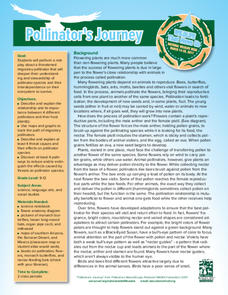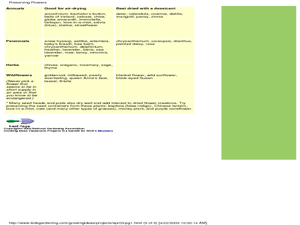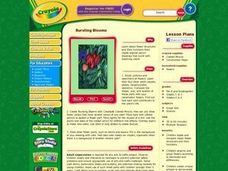Curated OER
Our Playground!
First graders observe and explore the playground's environment by walking around the playground, followed by a group discussion of what they observed. They then divide into groups and participate in centers, their brought back together...
National Wildlife Federation
Pollinator's Journey: Grades 9-12
Gain a deeper understanding of migratory pollinators. After studying about pollinators and their effects on flowering plants, learners hear a story about the migration of Monarch butterflies and bats in the Sonoma Desert. Small groups...
Chicago Botanic Garden
Seasons of a Plant
The third in a series of six lessons is an engaging three-part activity defines that discusses phenology, focusing on the cyclic seasons of plants. Pupils then observe phenology outside before determining how climate change can...
Curated OER
Add the Prepositions to Complete the Story
What is a preposition? How many can you list? This worksheet has learners fill in the blanks with prepositions listed at the top of the page. Great practice opportunity!
K12 Reader
Conjunctions: Or
Flower or tree? Rabbit or goat? Hamburger or hot dog? Young grammarians practice connecting nouns with conjunctions in a worksheet that focuses on using the word or.
Curated OER
Preserving Buds and Blooms
Learners learn how to preserve flower buds and blooms. In this gardening lesson, students explore the methods of air drying, using drying agents, and pressing plants to preserve them.
Curated OER
Insects Around Us
Students fill out worksheets about insects and how they are helpful to our world. For this insects lesson plan, students learn about flower parts and insects that pollinate them.
Curated OER
Vegetable Flowers with Homemade Ranch Dip
Vegetables aren't just things we can grow to eat; now they are things we can grow to create art! Use this cute and kid-friendly recipe during your next Earth Day celebration. It includes step-by-step instructions on how to turn...
Curated OER
Bursting Blooms Lesson Plan
Students study images and specimens of flowers before labeling the sepals, petals, carpels/pistils, and the stamens. They determine the function of each part. Using colored pencils, they design a drawing the different flower parts using...
Desert Discovery
Saguaro Parts
Young biologists identify the basic structures of a saguaro cactus. They study the functions of each of the structures, and label them on a picture of a saguaro cactus embedded in the plan. This simple, and easy-to-implement...
National Wildlife Federation
The Pollinator's Journey: Grades K-8
Bees get all the attention, but so many more creatures contribute to pollination. Scientists explore the role of pollinators as they learn about the parts of a flower and how it reproduces. They discover how plants rely on many different...
Curated OER
A Planting We Will Go
Even the youngest kids can make scientific comparisons using collected data. They read The Tiny Seed, then discuss the essential nutrients and elements needed for a seed to grow into a blooming plant. They plant seeds and track their...
Academy of American Poets
Teach This Poem: "The Tradition" by Jericho Brown
To begin this lesson, class members examine Antonius Hockelmann's painting "Tree Flowers II," record elements of the painting that they notice, and share their observations with a partner. Next, pupils do a close reading of Jericho...
Curated OER
Section 2.5 - Problem Solving (Part B)
Trying to figure out the perimeter of a geometric figure? Here are a few word problems to set up algebraic equations to solve for perimeter. There are also some word problems to set up algebraic equations to solve for angles in a...
Curated OER
Understanding the Roots
Students investigate the parts of a flower. In this earth science lesson, students read the book The Magic School Bus Plants Seeds and identify various plant parts. Students construct a model of a flowering plant from various art supplies.
Curated OER
Pollination
Students investigate pollination. In this plant biology lesson, students study a diagram of the reproductive parts of the flower and dissect and identify the parts of a real flower.
Curated OER
Pollination Station
Young scholars investigate why and how bees pollinate flowers and other plants. They define pollination, and read and sing along with the song "Yo, i'm a Flower." Students examine a diagram of a flower, simulate bees pollinating...
Curated OER
Plant Dissection
Students study plant parts and their functions in a dissection activity. In this plant dissection instructional activity, students use several handouts to help them learn parts of the plant and their functions. Students then dissect...
Curated OER
Looking at Flowers
Students use their bee sticks to cross-pollinate their Fast Plants and also focus in on the anatomy of flowers. They analyze how the parts of a system go together, and how these parts depend on each other. Finally, students describe...
Curated OER
Life Cycles
Students explore the parts of a flower and pollination of flowers. In this plants instructional activity, students use an interactive whiteboard to label the parts of a plant and the functions of each part. Students complete a worksheet...
Curated OER
Pollination
Third graders discuss pollination and how bees pollinate flowers. In this pollination lesson plan, 3rd graders draw the pollination process on a piece of paper.
Curated OER
Body Language
First graders investigate the three main parts of a plant. In this plant parts lesson, 1st graders explore vocabulary for the topic and read a story about plant parts. Students view a PowerPoint and take a quiz for the topic. Students...
Curated OER
What Bees Eat
Students consider the concept that plants and animals are dependent on one another and role-play the interaction between bees and flowers. They identify crops that are dependent on pollination by bees.
Curated OER
Eat Your Plants
Students explore fruits and vegetables. In this fruits and vegetables lesson, students work in small groups investigating plant parts. Students discover that fruits and vegetables originate from different parts of plants.

























